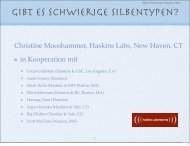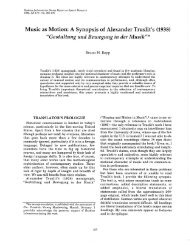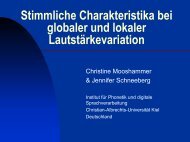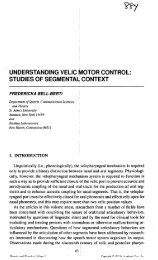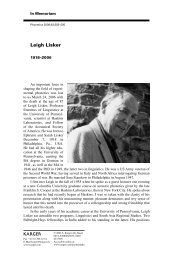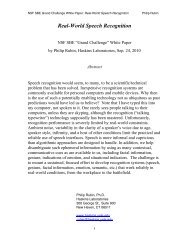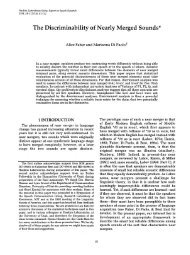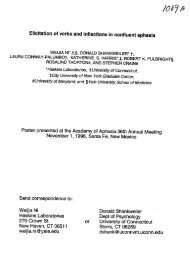Reception of Language in Broca's Aphasia* - Haskins Laboratories
Reception of Language in Broca's Aphasia* - Haskins Laboratories
Reception of Language in Broca's Aphasia* - Haskins Laboratories
You also want an ePaper? Increase the reach of your titles
YUMPU automatically turns print PDFs into web optimized ePapers that Google loves.
146<br />
14Like L<strong>in</strong>ebarger, Schwartz and Saffran (1983b), we f<strong>in</strong>d it implausible to suppose that the judgment task<br />
could permit syntactic structure to be computed by an alternative process<strong>in</strong>g route. As these authors<br />
po<strong>in</strong>t out, this supposition amounts to the claim that there exists a separate, redundant sentence parser<br />
that is employed solely <strong>of</strong>f l<strong>in</strong>e <strong>in</strong> certa<strong>in</strong> tasks. It should also be mentioned that the Zurif and<br />
Grodz<strong>in</strong>sky proposal, which envisions such a delay between the arrival <strong>of</strong> an utterance and its structural<br />
analysis, entails unrealistic demands on work<strong>in</strong>g memory. That is, suppose that <strong>Broca's</strong> aphasics are<br />
unable to carry out on-l<strong>in</strong>e pars<strong>in</strong>g. In order to judge grammaticality, then, they would be forced to<br />
accumulate and store a sentence as an unstructured aggregate <strong>of</strong> words that are subsequently fed <strong>in</strong>to<br />
the special <strong>of</strong>f-l<strong>in</strong>e pars<strong>in</strong>g device. However, it seems to us that the verbal memory limitations <strong>of</strong><br />
agrammatic aphasics would render them even less capable <strong>of</strong> such a feat than normal subjects.<br />
Shankweiler et ai.




